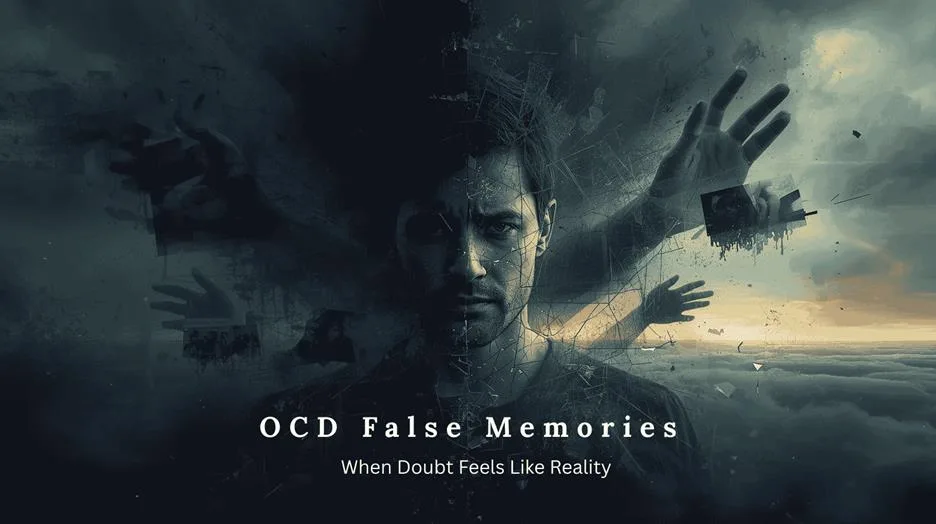
OCD false memories are a confusing and distressing experience for many people living with obsessive-compulsive disorder. Unlike typical forgetfulness, these memories feel vivid and convincing, even though there is no proof they actually happened. A person might suddenly fear they said or did something inappropriate, harmful, or immoral in the past. This doubt quickly grows stronger when fueled by anxiety, leading to guilt, shame, and repetitive self-questioning. Because the thoughts feel real, it is easy to become trapped in a cycle of overthinking and reassurance-seeking. Learning about OCD false memories is the first step to reducing their power and finding healthier ways to cope.
What Do OCD False Memories Mean?
False memories in the context of OCD are not lies or deliberate fabrications. Instead, they are intrusive doubts that distort a person’s sense of past events. Someone may “remember” making a serious mistake, even if nothing actually occurred.
The problem is not poor memory but the way OCD heightens uncertainty. People with OCD often struggle to trust their own recollection, which allows intrusive thoughts to take root. This makes a simple moment of doubt feel like a solid memory, even when it isn’t.
Why OCD False Memories Develop
OCD false memories usually stem from a mix of intrusive thoughts and constant self-doubt. A few common reasons include:
- Overactive imagination – OCD makes harmless thoughts feel intense and significant.
- Memory distrust – People begin questioning whether their memory is reliable.
- Anxiety loops – The more you analyze the thought, the stronger and “truer” it feels.
- Reassurance-seeking – Asking others repeatedly for confirmation unintentionally reinforces the doubt.
It’s important to note that OCD does not create new experiences—it only distorts and magnifies everyday thoughts.
Effects of OCD False Memories on Daily Life
Living with OCD false memories can feel exhausting. They don’t just stay in the background; they interfere with work, relationships, and confidence. Some common effects include:
- Emotional distress – Constant guilt or fear makes it difficult to relax.
- Strained relationships – Repeatedly asking loved ones for reassurance can create tension.
- Avoidance behaviors – People may avoid places or people connected to the intrusive thought.
- Reduced concentration – Mental energy is drained by constant rumination.
These effects make daily functioning harder, often leaving individuals stuck in cycles of doubt and anxiety.
Practical Ways to Cope With OCD False Memories
Even though OCD false memories can feel powerful, they are manageable with the right strategies:
- Cognitive-behavioral therapy (CBT), especially Exposure and Response Prevention (ERP), is an extremely effective treatment.
- Mindfulness practices help people step back from thoughts without engaging with them.
- Limiting reassurance breaks the habit of asking for constant validation.
- Grounding techniques (focusing on present surroundings) reduce the pull of obsessive doubts.
- Professional guidance ensures progress through structured treatment.
Consistency is key. Progress may be slow at first, but small steps build resilience over time.

Misunderstandings About OCD False Memories
Many people misunderstand what OCD false memories mean. Clearing up myths can reduce shame and stigma:
- “They are lies.” In reality, these memories feel real to the person, even if they are not accurate.
- “If I remember it, it must be true.” With OCD, the line between thought and memory is blurred by anxiety.
- “Only major trauma leads to false memories.” OCD false memories often involve everyday events magnified by doubt.
Recognizing these myths helps people take back control from OCD-driven beliefs.
FAQ: OCD False Memories
1. What exactly are OCD false memories?
They are intrusive doubts that feel like memories, usually triggered by obsessive-compulsive disorder.
2. How do I know if a memory is false or real?
Real memories are usually stable over time, while OCD false memories are uncertain, repetitive, and linked with overwhelming guilt.
3. Do OCD false memories last forever?
No. With therapy, mindfulness, and practice, they often become weaker and less convincing.
4. Can OCD false memories affect loved ones?
Yes. Constant reassurance-seeking or avoidance may create strain, but open communication and treatment help reduce the impact.
Conclusion
OCD false memories can make harmless thoughts feel like dangerous realities, leaving individuals caught in cycles of doubt and guilt. These intrusive recollections are not signs of wrongdoing but a symptom of obsessive-compulsive disorder. By learning how they develop, understanding their impact, and applying coping strategies like CBT, mindfulness, and reduced reassurance-seeking, people can regain confidence and peace of mind. With patience and proper support, it is possible to lessen the power of OCD false memories and move toward a healthier, more balanced future.
